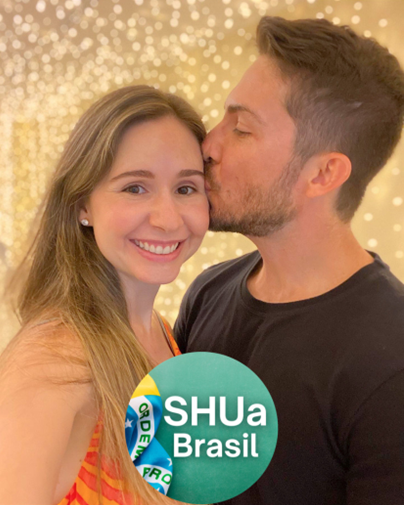
We’re very pleased to offer another in our series of ‘aHUS around the World’ where we feature the news and views of patients in a specific nation. As an adult diagnosed with aHUS Pamela Notario has been personally affected by this rare disease and deeply understands the landscape which must be navigated by patients and aHUS caregivers. Representing the aHUS community in Brazil and an important voice on global issues as well, Pamela volunteers as a member of the aHUS Community Advisory Board (aHUS CAB).
Pamela Notario has been instrumental in having her nation recently recognize aHUS Awareness Day to be marked on 24 Sept 2023 across Brazil. No one can better explain the needs and challenges of atypical HUS patients and their families than those who ‘rise above aHUS’ in their daily lives. This interview by the aHUS Alliance Global Action team blends Pamela’s insights and commitment to personal wellness together with her dedication to help other aHUS patients and their families.
We appreciate and applaud those people who juggle the myriad facets of busy lives, despite caring for themselves or a loved one living with aHUS, yet still make time to help us better understand the ‘aHUS space’ in their country. After reading our interview with Pamela we hope that you too will have a better sense of what’s facing aHUS families in Portugal.
The aHUS Alliance Global Action team strives to amplify the voices of aHUS families around the world, but we can’t do it without the hard work and advocacy commitment of actual patients and family caregivers. We hope that aHUS advocates in other nations shine a focused spotlight atypical HUS around the world, by sharing their own thoughts and introducing advocacy needs and efforts within their nation – yet can only happen when fine people like Pamela Notario make the effort. If there’s no national aHUS patient group in your country, we can help! Learn more about our aHUS R.O.W (Rest Of the World) initiative to encourage and support aHUS global advocacy – Click HERE.

Atypical HUS Around the World – with Pamela Notario of SHUa BRASIL
SHUa – Síndrome Hemolítico Urêmica atípica
1. Tell us a bit about your aHUS journey. What do you feel might be different from, or similar to other aHUS patient experiences?
I was diagnosed in 2018, after being in the hospital for almost 4 months. My experience with aHUS started with feelings of exhaustion, which I initially blamed on an exceptionally busy time at work. Instead it was my body indicating the first symptoms of what would turn into a big journey through this disease. At the time I was living in a major city in Brazil, but even going to a great hospital the doctors couldn’t pinpoint exactly what was going on. By the end of the first week, my life was at risk and doctors were afraid that I wouldn’t survive another week. My medical team suggested that I move to another hospital, considered the best in Brazil, where I would be seen by additional experts and have access to specialized care.
With a variety of symptoms and treatment including lung surgery, kidney biopsy, with some dialysis and plasma exchange, I finally got my diagnosis. I have aHUS. Those months were the most scary period of my life. Due to the distance from my home to the hospital, which involved a 4 hour flight, my mother stayed with me as my husband couldn’t be with me all the time. I felt very alone, missed my family, my house, my friends and especially my husband. On the other hand, I knew God was taking care of me, so I was able to rest in this trust. Even feeling weak, He gave me strength to carry on.
I must be honest and say that leaving the hospital was a relief, but at the same time frightening. Now I was on my own, living a new life. I had to quit my job, leave college and start treatment. Doctors’ appointments took hours, lab tests occurred every two days, bureaucratic issues were often and long infusions took up much of the remaining time – that formed my new routine.
2. What’s currently the situation of aHUS issues and treatment for patients in Brazil?
The long process to receive an aHUS diagnosis is still an issue in Brazil. Unfortunately some patients only are diagnosed after losing kidney function. I was one of the lucky ones, and able to have the opportunity to go to a good hospital; however, that’s not the case for the majority of people. Being in a public hospital makes aHUS patient outcomes worse in Brazil, but on the other hand, being in a private hospital can cost a lot. While treatment with eculizumab is funded by the government, it sometimes can take months or a year for aHUS patients to actually receive the drug. Even after having the benefit granted for government funding of eculizumab, some delays happen. In 2017 patients went a year without the drug, so some of them couldn’t survive and others lost kidney function. Since January 2023 ravulizumab has been available in Brazil, but it’s not simple to make the transition from eculizumab to this other drug. The approval process to switch between these therapeutic drugs can take months.
3. Atypical HUS advocacy looks different around the world, so could you please inform us about outreach and education efforts in Brazil?
I’ll always stress this important point – information can save lives. We have established organizations that help patients with rare diseases. I’m happy to report that in May 2023, the government passed a law creating a national aHUS Day in Brazil. One benefit of that will be more awareness and attention focussed on atypical HUS, so doctors, nurses and health professionals in general will learn about the disease. In 2023 I started an Instagram account sharing aHUS information, and while it’s still a small account if we help the life of even one aHUS patient, we are making a difference. Some doctors do a brilliant job collaborating and sharing information about rare diseases, and we appreciate the fine efforts of Dr Lilian Palma and Dr Maria Helena Vaisbich. I really hope that now with the new law established to mark aHUS Day in Brazil we will see more information about atypical HUS, and that will shorten the diagnosis.
4. For adults with aHUS, finding balance with navigating work with family is difficult. What works for you, and what do you see as areas for improvements needed to assist self-advocacy?
It took me six months from my first onset of atypical HUS activity to feel I’d come back to life. Even after my hospital stay, I couldn’t return to what I had considered as ‘my normal life’ again. Primarily it was because I was so tired all the time, but also because there were so many doctor appointments, medical tests, aHUS treatment, and bureaucratic issues to deal with. There was simply no time left for my college classes and work anymore. I really thought that my life would stay that way! Luckily I was wrong, and things started to fall into place. I began to feel better, and with the disease finally under control I felt as if I were able to breathe again. When I talk to a patient who has been newly diagnosed, I always emphasize ‘things will be better’ and that they will gain control of their life again after this very difficult initial phase. It takes a while, but the overwhelming nature of aHUS and its crashing waves will calm down into life’s more usual ebb and flow patterns. For me, it started to happen when I realized that the treatment isn’t something bad, but just another part of my lifestyle and a routine task that occurs once in a while. I’m blessed by having a supportive husband and family, they helped me a lot and still do!
Today I see my treatment as framing a positive day. I bring a book to read or choose a movie to watch, and sometimes even use this time to finish something from work. I’m fortunate to have a very flexible agenda, so every two weeks I have the option to plan activities and my work schedule to accommodate my IV infusion. While I could choose not to work on a particular infusion day, like most people that would mean I would not get paid so that’s a tricky choice I don’t often make. I choose to consider that time as my special day! It’s the day that I thank God for having the medicine, for having family support, for having my husband, for being healthy and alive.
5. After diagnosis, adults living with aHUS need to move forward with all aspects of their lives and to be active participants in their healthcare. What components do you feel are essential to your health?
If you have a rare disease you must consider three things as essential: eating a balanced diet, maintaining a regular exercise routine, and being mindful of your mental health. These things are crucial for life! Every person has some sense of the connections between mind and body, with some understanding of how the diet’s effect on general health strongly impacts their life. As an individual with aHUS and a nutritionist by profession, it’s not just about having a ‘kidney friendly’ diet but also one which considers choices which promote ‘gut health’ and help control inflammation. Vitamins and probiotics may support or promote improvement of general health, so check with your medical team. Exercise can help control inflammation and will keep you strong. Don’t forget to consider your mind and mental wellness! Emotions can affect the body in physical ways, so be mindful of what’s in your heart and thoughts as they can make a difference to your health overall. Even small changes can bring huge benefits. Before my diagnosis I was a bit of a workaholic, trying to do everything at the same time. Now I realize that it’s important to rest, to take time to breathe, think and just take care of myself. My priority is my health, and every aspect that affects it. Living a life where I feel ‘okay’ isn’t enough, so I’ve learned to take better care of myself and try to make every day excellent!
6. What haven’t we asked, that you’d like to address?
I believe that there is always something to learn. With every moment, good or bad, I ask myself two questions: ‘What can I learn from this?’ and ‘What potential exists for this circumstance to change my life?” Our thoughts change the way that we see things around us, and the way we see things around us impacts our life. If we change our mindset, we can change our life. It’s not easy living with a rare disease and I certainly have my share of ups and downs. Yet I don’t let it define me, it’s just a part of who I am. Think positive, stay strong in faith, and keep learning.


